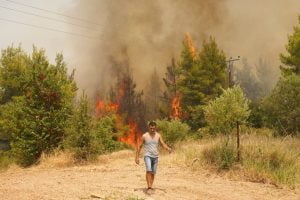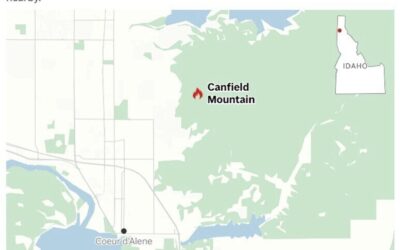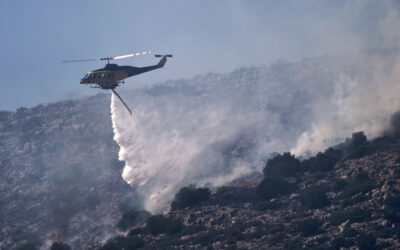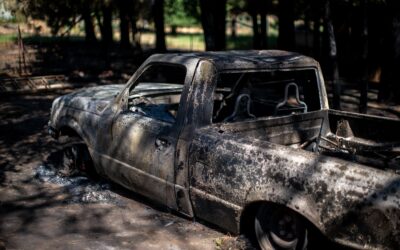
A wildfire burns a forest in Avgaria village on Evia island, about 184 kilometers (115 miles) north of Athens, Greece, Tuesday, Aug. 10, 2021. A massive wildfire burning for days on the northern tip of Greece’s second largest island continued to devour forests Tuesday, its thick smoke hanging in the streets of a nearby town as hundreds of firefighters battled to save what they could. (AP Photo/Petros Karadjias)
By PETROS KARADJIAS and NICHOLAS PAPHITIS Associated Press
PEFKI, Greece (AP) — Hundreds of firefighters from across Europe and the Mideast worked alongside their Greek colleagues in rugged terrain Wednesday, trying to contain flareups of the huge wildfires that have ravaged Greece’s forests for a week, destroying homes and forcing thousands to evacuate.
The spread of the blazes has been largely halted, officials said, but fronts still burned on the large island of Evia and in Greece’s southern Peloponnese region, where several homes were on fire, according to state ERT TV.
The fires broke out last week after Greece had just experienced its most protracted heatwave since 1987, leaving its forests tinder-dry. Other nearby nations such as Turkey and Italy faced similar searing temperatures and quickly spreading fires, while Spain and Portugal were on alert Wednesday for wildfires amid a heat wave forecast to last through Monday.
At the southern side of the Mediterranean Sea, wildfires in Algeria’s mountains have killed 65 people, including 28 soldiers sent in to help, and three days of national mourning begin Thursday.
Worsening drought and heat – both linked to climate change – have also fueled wildfires this summer in the Western U.S. and in Russia’s northern Siberia region. Scientists say there is little doubt that climate change from the burning of coal, oil and natural gas is driving more extreme events.
Greece’s fire service said 900 firefighters, including teams from Poland, Romania, Cyprus, Ukraine, Serbia, Slovakia and Moldova, and 27 aircraft were working on Evia, Greece’s second-largest island which is linked to the mainland by a bridge.
Greek Prime Minister Kyriakos Mitsotakis spoke on the phone Wednesday with top officials from Ukraine, Qatar and Romania to “warmly thank them” for their contributions. The three countries sent 340 firefighters and 24 vehicles in response to Greece’s appeal for help.
Evia’s northern part, which has forests entwined with villages and small seaside resorts, has suffered the greatest damage, with an estimated 50,000 hectares (123,000 acres) lost and dozens of homes burned.
Retiree Maria Roga said although her house in Pefki, a village on Evia, was saved from the flames that burned a neighboring home, she still worries about flare-ups.
“I’m still afraid. I’m afraid,” she told The Associated Press on Wednesday. “(But) I can’t complain. I am very grateful, I am one of the lucky ones.”
Although most of Pefki’s homes are intact, the village — whose name means pine tree — is now surrounded by ranks of blackened trees.
Some 600 firefighters from Greece, the Czech Republic, Britain, France and Germany were also deployed Wednesday near ancient Olympia and in Arcadia in the Peloponnese, assisted by 33 water-dropping aircraft — including two Russian Ilyushin Il-76s that can drop more than 40 tons at one go.
A massive fire that broke out last week north of Athens has been limited to a section of a national park on Mount Parnitha. Firefighters from France, Qatar, Kuwait and Israel were deployed there.
That fire only caused minimal damage to the former royal summer palace of Tatoi under Mount Parnitha, although the surrounding forest was largely destroyed, Greek culture officials said. A tiny number of the estate’s 100,000 artifacts in storage was destroyed — which the culture ministry said had been “of small value and in poor condition.”
Despite the widescale destruction to forests, wildlife and livestock — and homes, although official estimates are not yet available — Greek authorities’ policy of evacuating villages to protect lives has paid off. No residents or tourists were killed in the wildfires. One volunteer firefighter died last week and two have been hospitalized in serious condition with burns.
In contrast, a wildfire in 2018 killed 102 people near Athens.
The health ministry said Wednesday another three firefighters required treatment for respiratory problems and light burns suffered in the Arcadia fire.
Nevertheless, some locals criticized the evacuation policy, saying while it saved lives it sent away villagers who could have helped firefighters battle the flames. Others have complained that water-dropping planes and even ground forces were absent at crucial times.
On the outskirts of Kamatriades on Evia, residents cutting firebreaks through the forest said they had received no help in protecting their village.
“We need some help here, we need some help! We are fighting alone (for) seven days now,” said Dimitris Stefanidakis.
Greek officials say they did everything they could against the fire service’s biggest-ever challenge. In eight days, authorities had to deal with 586 fires across the country, while heavy smoke from the fires often reduced visibility so much that water-dropping aircraft could not be deployed safely.
The causes of the blazes are under investigation, and authorities say that in at least one major blaze arson seems likely. Several people have been arrested.
The government has pledged a large compensation and reforestation program.
Big wildfires were also burning in Italy, which claimed two more lives Wednesday — bringing the overall toll this month to four. Authorities said a 77-year-old shepherd was found dead in the southern Calabria region. Reports said he was in a farmhouse where he had apparently sought refuge with his flock.
And a 30-year-old farmer died near Catania when he was crushed by his tractor while fighting a blaze. Last week in Italy, a woman and her nephew died of smoke inhalation as they tried to save the family olive grove.
In Turkey, firefighters worked Wednesday to extinguish a wildfire in the southwest Mugla province. At least eight people and countless animals have died in Turkey in more than 200 wildfires since July 28.
___
Paphitis reported from Kontias, Greece. Lefteris Pittarakis in Kamatriades, Greece, Frances D’Emilio in Rome and Suzan Fraser in Ankara, Turkey, contributed.
___
Follow all AP stories on climate change issues at https://apnews.com/hub/climate




